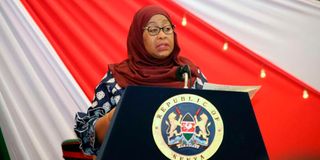Tanzania’s new regional diplomacy resetting trade, social ties with Kenya

Tanzanian President Samia Suluhu Hassan addresses participants at the Kenya-Tanzania business forum held at the Serena Hotel, Nairobi, on May 5, 2021.
What you need to know:
- Under President Jakaya Kikwete (2005-2015), Kenya was not a competitor but a strategic partner.
- Trade between the two countries increased by 40 per cent, and Kenya became Tanzania’s largest trading partner.
Tanzania is, certainly, an under-rated power. Its strategists, however, view East Africa’s largest country as the spider weaving diplomatic relations at the centre of the web. With the coming of President Samia Suluhu Hassan to power, Tanzania is on a diplomatic charm offensive aimed at remaking East, Central and Southern Africa.
This comes after years of frosty Kenya-Tanzania relations. Even Tanzania’s most virulent populists, from Julius Nyerere to John Magufuli, have considered East Africa’s economic powerhouse as a strategic neighbour.
Under President Jakaya Kikwete (2005-2015), Kenya was not a competitor but a strategic partner. Trade between the two countries increased by 40 per cent, and Kenya became Tanzania’s largest trading partner with an investment of $1.65 billion. According to Tanzania Investment Centre, by 2015, some 529 Kenyan firms had invested an estimated $1.7 billion in Tanzania, creating employment for about 56,000 Tanzanians.
At the end of 2019, Kenya’s exports to Tanzania stood at US$329.56 million while imports from Tanzania totalled US$269.78 million, according to the United Nations database on international trade.
Tanzania set its diplomatic relations with Kenya during the ‘era of the beautiful bride’. It established a High Commission in Nairobi and later a consulate in Mombasa. Tanzania was a founder member of the East African Community (EAC) in 1967 before it collapsed in 1977 and got revived in 2000.
Tanzania’s third President Benjamin Mkapa mediated between former President Daniel arap Moi and Uganda’s President Yoweri Museveni. He also helped broker peace in Kenya after the 2008 post-election crisis. On November 30, 2019, Tanzania backed Kenya’s bid for a non-permanent seat in the United Nations Security Council.
Tanzania’s revenge moment
But the founding fathers had already sown the seeds of discord characterised by a serious ideological falling-out as Kenya under Jomo Kenyatta courted free market capitalism and Tanzania under Mwalimu Julius Nyerere drifted to socialism.
Kenya looked to the Horn of Africa and Tanzania looked South. In 2013, Kenya teamed up with Uganda and Rwanda in the so-called ‘Coalition of the Willing’, a tripartite initiative to fast-track the EAC regional integration, sidelining Tanzania and Burundi for ‘non-commitment’.
Tanzania’s revenge moment came in 2016. Disregarding an oil pipeline deal between Kenya and Uganda, planned to move 6.5 billion barrels from Uganda’s oil-rich Lake Albert region, Tanzania clinched a new deal to transfer the oil through its Indian Ocean port of Tanga, a blow to the Kenya-led Lamu-Port-South-Sudan-Ethiopia Transport (LAPSSET) project.
A week after taking office in 2015, John Pombe Magufuli banned Kenyan dairy firm Brookside and directed that all milk be processed locally. In 2017, he ordered the burning of Kenyan chicks illegally imported into Tanzania and auctioned about 1,125 cattle from Kenya after Kenyan Maasai herders crossed the border in search of pasture.
And in 2018, he imposed a 25 per cent import duty on Kenyan confectionery (chocolate, ice cream, biscuits and sweets), charging that Kenya was using imported sugar in breach of the EAC protocol. Tanzania’s cavalier approach to Covid-19 triggered border tensions and disrupted trade.
In July–August 2020, Tanzania banned three Kenyan airlines from flying into the country after Nairobi removed Tanzania from a list of more than 30 countries allowed to resume international flights into Kenya. Kenya banned maize imports from Tanzania and Uganda over aflatoxin claims.
But there is a new sheriff in town. President Suluhu has already visited Uganda and Kenya to reset relations. President Uhuru Kenyatta was notably the only EAC Head of State to personally attend the state funeral of President Magufuli in Dodoma, compared to nine from the SADC region.
Burning of chicks
Mr Kenyatta momentarily halted his eulogy to allow for the call of Muslims to prayer, a decision hailed widely as respect for Tanzania and a bridge-builder with the larger Muslim fraternity. On April 10, 2021, Nairobi sent a delegation to invite Mama Samia to Kenya.
Tanzania has been a ‘hard power nation’ . It started with the 1964 Revolution in the island of Zanzibar. Tanzania was among the frontline states that waged war against racism and apartheid regimes in Southern Africa. And in 1979, it militarily intervened in Uganda to remove Idi Amin from power. Its soldiers are enforcing peace in Eastern Congo as part of the UN Force Intervention Brigade.
As the new face of Tanzania’s benign soft-power, Suluhu has quietly jettisoned the populist policies of her predecessors. She has extended an olive branch to opposition leaders, pardoned prisoners and ended frosty relations with the civil society, media, private sector and the investors.
She has committed to work with her EAC neighbours to harmonise Covid-19 protocols. Suluhu’s mandarins are re-engineering the Joint Commission on Cooperation (JCC) with Kenya, a bilateral council of senior officials established in 1988 under Mkapa to facilitate trade, investments and ease of conducting business.
While in Nairobi, President Suhulu signed watershed bilateral deals, including on a gas pipeline from Dar to Mombasa and cooperation in culture, arts, social integration and national heritage.
In Power of Babel: Language and Governance in the African Experience (1998), Ali Mazrui and Alamin Mazrui depicted Kiswahili as the fastest growing of Africa’s nearly 2,000 languages – and perhaps in the world. And Kiswahili is set to soar Tanzania’s soft power in the era of Suluhu.
Professor Kagwanja is a former Government Adviser and currently Chief Executive at the Africa Policy Institute.





